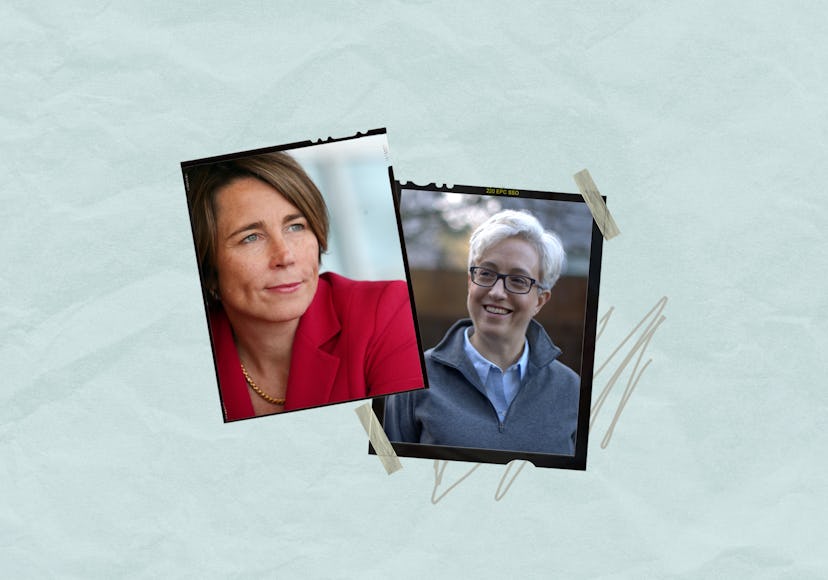Politics
These 2 Women Could Be America’s First Lesbian Governors
Maura Healey and Tina Kotek are racing toward a Nov. 8 finish line.

Maura Healey and Tina Kotek may be running for governor on opposite sides of the country, but both women are poised to make history: If elected on Tuesday, Nov. 8, they’ll become America’s first lesbian governors.
Kotek is running as a Democrat in Oregon, where she served as speaker of the house from January 2013 to January 2022. Healey, also a Democrat, has been the Massachusetts attorney general since 2014. (When elected with 63% of the vote, she became the nation’s first gay attorney general.) Though their current goals and campaign platforms are similar, their entries into politics couldn’t have been more different.
Healey’s path started in 2007, when she left a career as a business lawyer to become head of the Massachusetts attorney general’s Civil Rights Division. After five years in the role, she ran for AG. “I was not expecting to be in politics,” Healey tells Bustle. “I came to really understand what it means to work in an office as the people’s lawyer. That’s what inspired me to run back in 2014, even though I’d never run for office.”
Kotek became interested in public service in the ’90s while working as president of graduate student government at the University of Washington, where she earned a master’s degree in international studies and comparative religion. “We were trying to make sure students and faculty had access to domestic-partnership benefits,” Kotek says. “I was in a long-term relationship at the time, so I applied for married student housing on campus. I was denied, I filed a discrimination complaint, and was denied again. That got me started in saying, ‘I need to stand up for myself and others.’” After graduating, she took a job with the Oregon Food Bank and started doing advocacy at the state’s Capitol.
Both Kotek and Healey are running on fairly traditional Democratic platforms, which emphasize issues like reproductive rights and gun control. They’ve made environmental protections key parts of their platforms, and see young voters motivated by climate change. Kotek plans to protect progress she made in the Oregon legislature, while Healey hopes to lead Massachusetts to net-zero emissions by 2030. “I want to be the most aggressive governor in the country when it comes to addressing climate,” says Healey, who’s 51. “And that resonates with young people who are demanding action from their leaders.”
“I have a Teens for Tina group, and climate is a really big deal for them,” says Kotek, who’s 55. “They’re out there doing canvasses and recruiting all their friends, mostly from high schools, saying, ‘We have to do this.’ They have been phenomenal.”
Recent events have demonstrated the importance of LGBTQ+ representation in state government with extreme clarity. Consider Florida’s “Don’t Say Gay or Trans” bill, or Texas Gov. Greg Abbott’s decision to view gender-affirming care for trans youth as child abuse. “The state is where your basic protections come from,” says Kotek. “When you have LGBTQ+ individuals in elected office, they bring their personal perspective to the table every single day. That matters when you’re making public policy.”
While LGBTQ+ representation in state government has improved over time, 10 states have fewer LGBTQ+ elected officials this year than they did in 2021, according to a report from advocacy group LGBTQ Victory Institute. Currently, Oregon’s Kate Brown and Colorado’s Jared Polis — both Democrats — are the only LGBTQ+ governors in the country, with Brown’s term ending this year.
Healey feels a lack of representation has prevented many LBGTQ+ people from running for office, but hopes her career will change that. “I know from having been elected as the country’s first openly gay attorney general, it meant something to me when people would come up to me and say, ‘Now, I think more is possible for me or for my LGBTQ child,’” she says. “You’re going to have the best laws and policies if everybody's around the table.”
According to election forecasts from Politico and FiveThirtyEight, both candidates are likely to beat their Republican opponents (Christine Drazan of Oregon and Geoff Diehl of Massachusetts), but nothing is guaranteed. Kotek puts her feelings on the matter succinctly: “It’s going to be great to have two lesbian governors, one on each coast, so we can keep everything going forward.”